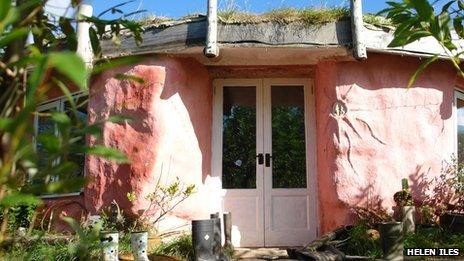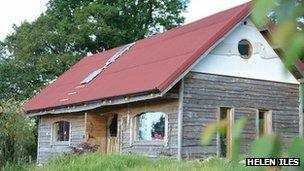Pembrokeshire eco village Lammas film hits cinemas
- Published
Residents won planning permission in 2009 to build nine smallholdings
A film showing life for families building a home in a Pembrokeshire eco village is being premiered at cinemas.
Residents won planning permission in 2009 to build a community of nine smallholdings at Glandwr designed to be low impact and self-sufficient.
Debates are being held after Tuesday's screenings in Cardiff, Cardigan and Aberystwyth, involving residents.
They have five years to demonstrate they are at least 75% self-sufficient as part of their planning permission.
Other screenings are being held in Wrexham and Colwyn Bay in north Wales, and other communities in the UK where the debates are due to be screened.
Paul Wimbush, founder of the Lammas community, describes it as "a radically different way of life" but one that could be achieved by anyone.
He says the community which produces its own power and fuel, and harvests its own water and food, is trying to be ethical in the way it lives and was 20% self-reliant in its second year.
And he expects figures yet to be produced for year three to show residents generated 40% of their own needs.

Houses are made from timber with straw bales and a turf roof
Residents such as basket weaving tutor and beekeeper Melissa Holloway run their own micro businesses to provide additional income.
Straw insulation
She and husband Matthew along with their two children moved into the community in 2010.
While the children go to school the couple have set about building their own home. They are living in a static caravan in the mean time.
"It has been very hard work but exciting," said Ms Holloway, who admits to it being an enormous and challenging task.
Fellow resident Simon Dale, who appears in the film - Living In The Future - took two months and about £3,000 to build his "Hobbit house", made from timber with straw bales for insulation, a turf roof and recycled double glazing.
"The way we are living in the wider sense is not serving us as people and the planet that we live on," he said.
"Just knowing the smallest amount about natural building techniques, it was quite obvious that we could build something which was probably a lot more functional than the average, with materials which were really nice, really natural, really non-toxic, really available and quite cheap."
The documentary by independent film-maker and director Helen Iles is being shown at a number of theatres including Cardiff's Chapter, external arts centre, Theatr Mwldan, external in Cardigan and Aberystwyth Arts Centre, external at about 20:00 GMT.

The Welsh government adopted a planning policy to create more sustainable rural communities
Eco village residents are among those taking taking part in a debate afterwards at these and other venues showing the film.
Former environment minister Jane Davidson is chairing the question and answer session at Theatr Mwldan.
The Welsh government adopted its planning policy known as Tan 6, external to create more sustainable rural communities and housing.
Mrs Davidson, who is now director of the sustainability institute at the University of Wales Trinity Saint David, said she hoped publicising the village's work would lead to more people developing their own ideas for sustainable living or finding new ways to "create a living off the land".